鲁教版初中英语中考二轮复习 专题八 谓语动词的时态(共49张PPT)
文档属性
| 名称 | 鲁教版初中英语中考二轮复习 专题八 谓语动词的时态(共49张PPT) |  | |
| 格式 | pptx | ||
| 文件大小 | 1.1MB | ||
| 资源类型 | 教案 | ||
| 版本资源 | 鲁教版 | ||
| 科目 | 英语 | ||
| 更新时间 | 2023-12-28 19:57:00 | ||
图片预览

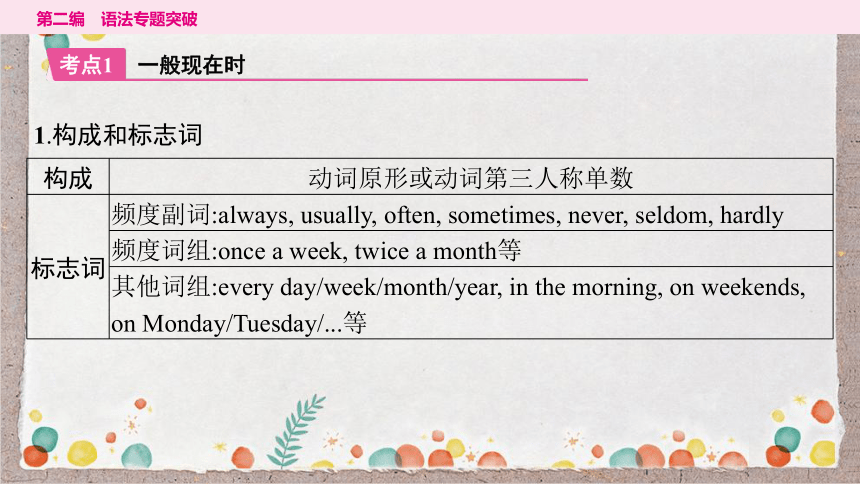
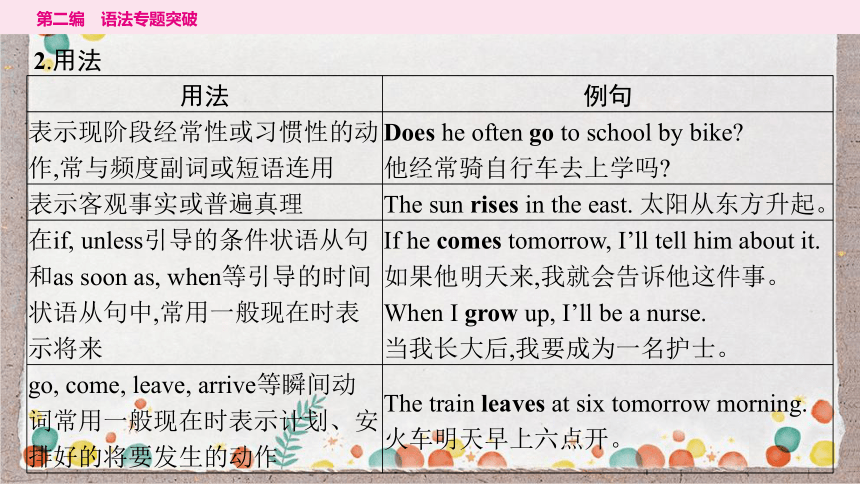
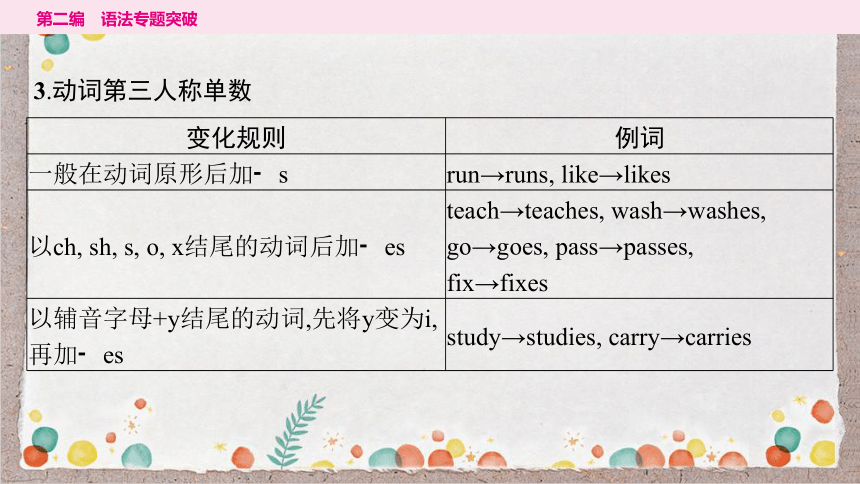
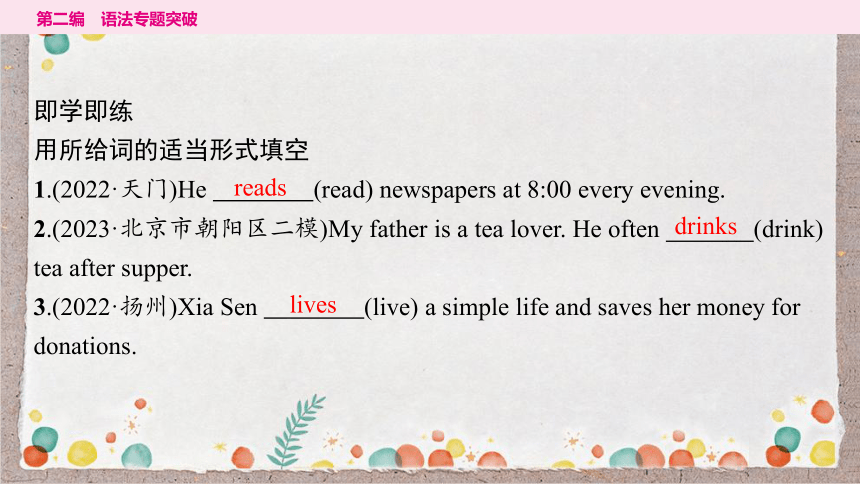
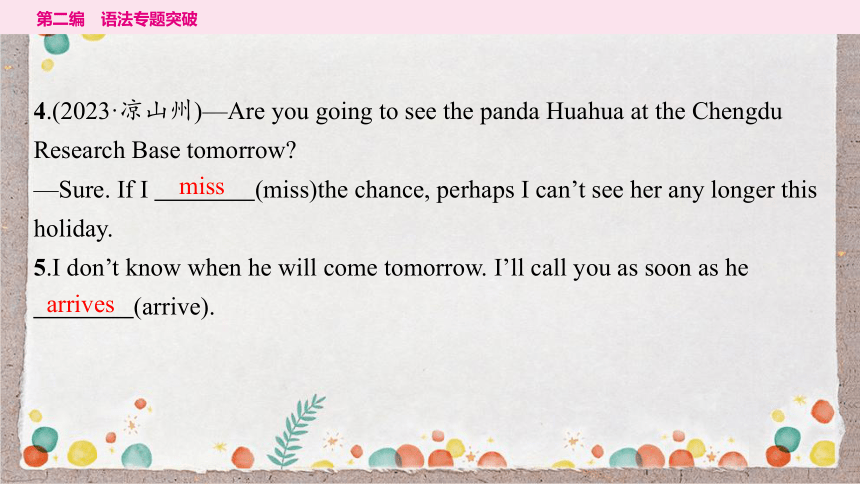
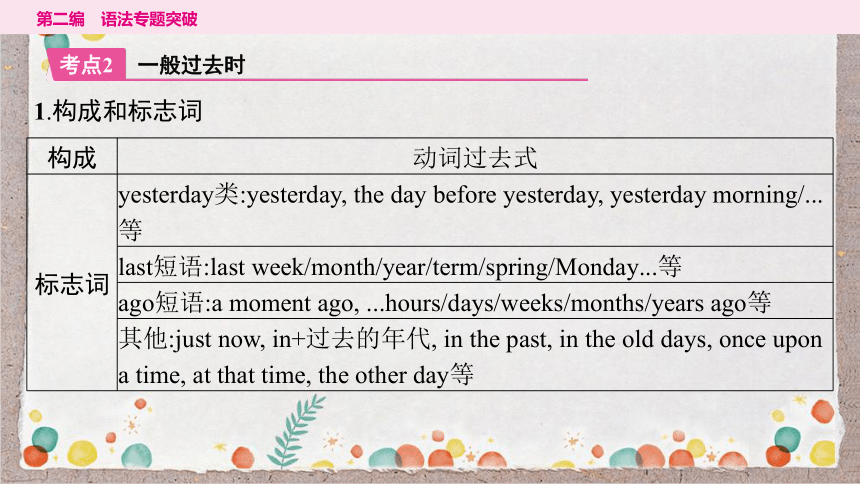
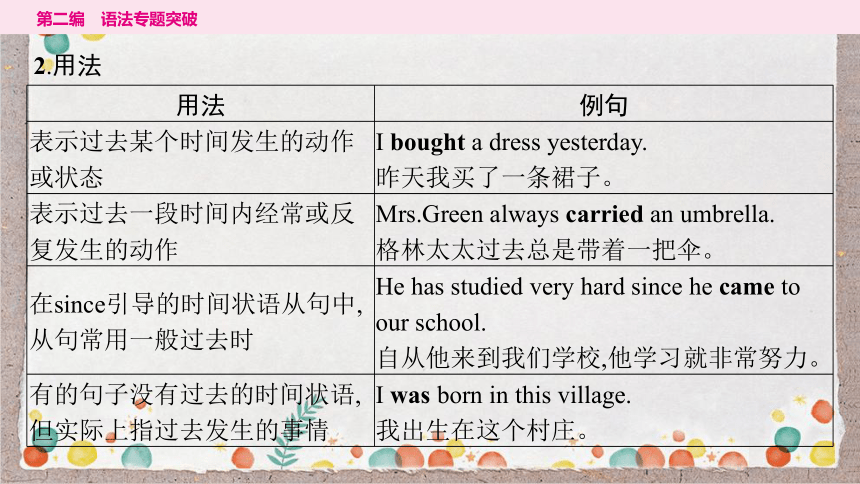
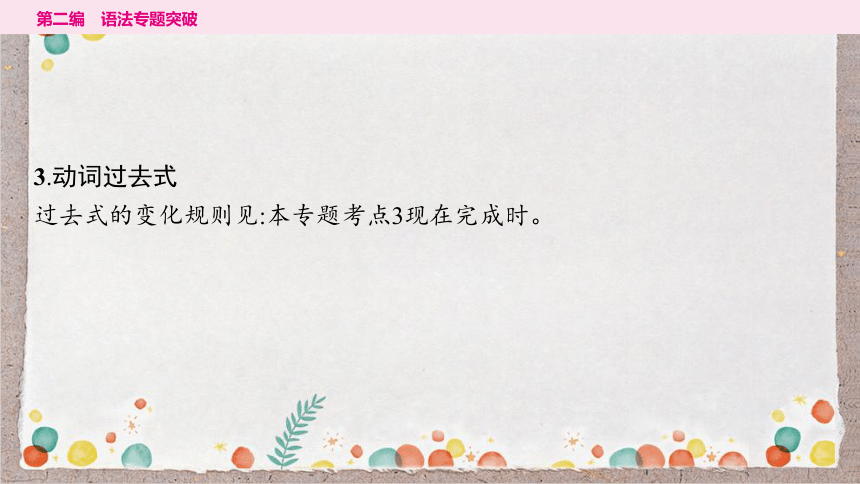
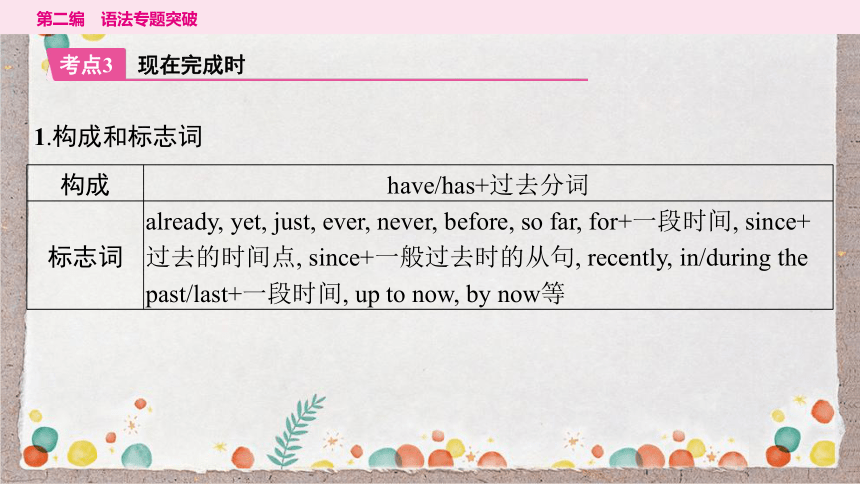
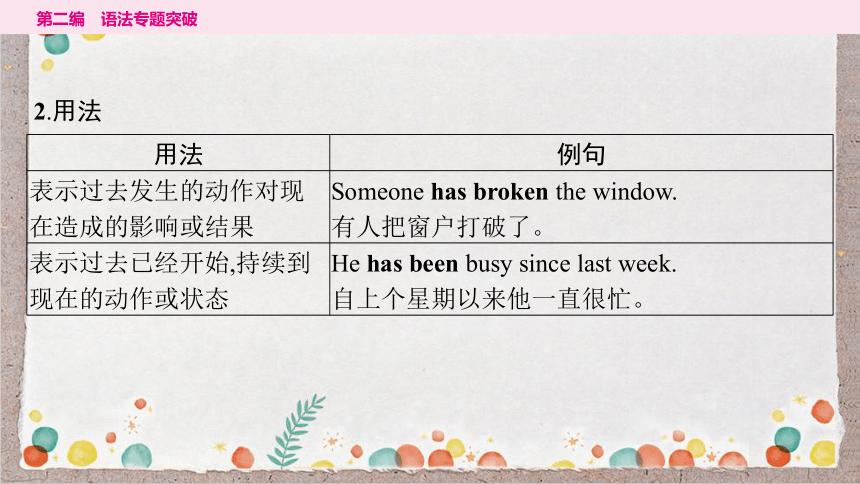
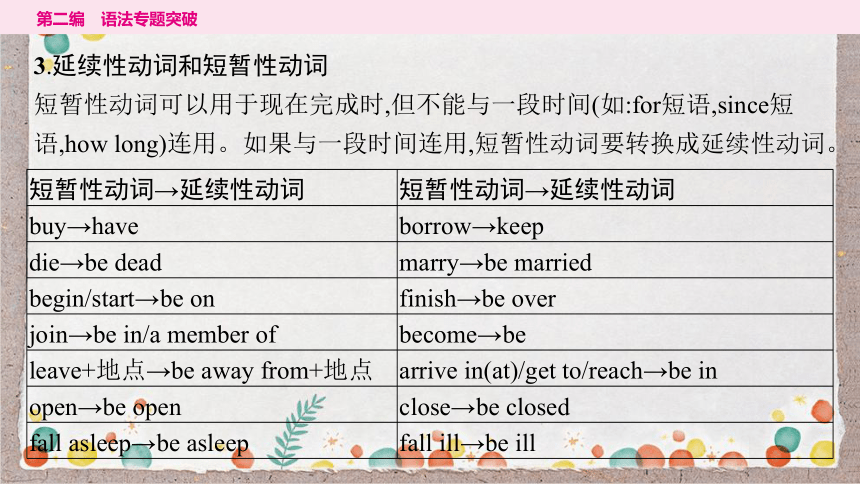
文档简介
(共49张PPT)
谓语动词的时态
考点1
一般现在时
1.构成和标志词
构成 动词原形或动词第三人称单数
标志词 频度副词:always, usually, often, sometimes, never, seldom, hardly
频度词组:once a week, twice a month等
其他词组:every day/week/month/year, in the morning, on weekends, on Monday/Tuesday/...等
2.用法
用法 例句
表示现阶段经常性或习惯性的动作,常与频度副词或短语连用 Does he often go to school by bike
他经常骑自行车去上学吗
表示客观事实或普遍真理 The sun rises in the east. 太阳从东方升起。
在if, unless引导的条件状语从句和as soon as, when等引导的时间状语从句中,常用一般现在时表示将来 If he comes tomorrow, I’ll tell him about it.
如果他明天来,我就会告诉他这件事。
When I grow up, I’ll be a nurse.
当我长大后,我要成为一名护士。
go, come, leave, arrive等瞬间动词常用一般现在时表示计划、安排好的将要发生的动作 The train leaves at six tomorrow morning.
火车明天早上六点开。
3.动词第三人称单数
变化规则 例词
一般在动词原形后加 s run→runs, like→likes
以ch, sh, s, o, x结尾的动词后加 es teach→teaches, wash→washes,
go→goes, pass→passes,
fix→fixes
以辅音字母+y结尾的动词,先将y变为i,再加 es study→studies, carry→carries
即学即练
用所给词的适当形式填空
1.(2022·天门)He (read) newspapers at 8:00 every evening.
2.(2023·北京市朝阳区二模)My father is a tea lover. He often (drink) tea after supper.
3.(2022·扬州)Xia Sen (live) a simple life and saves her money for donations.
reads
drinks
lives
4.(2023·凉山州)—Are you going to see the panda Huahua at the Chengdu Research Base tomorrow
—Sure. If I (miss)the chance, perhaps I can’t see her any longer this holiday.
5.I don’t know when he will come tomorrow. I’ll call you as soon as he
(arrive).
miss
arrives
考点2
一般过去时
1.构成和标志词
构成 动词过去式
标志词 yesterday类:yesterday, the day before yesterday, yesterday morning/...等
last短语:last week/month/year/term/spring/Monday...等
ago短语:a moment ago, ...hours/days/weeks/months/years ago等
其他:just now, in+过去的年代, in the past, in the old days, once upon a time, at that time, the other day等
2.用法
用法 例句
表示过去某个时间发生的动作或状态 I bought a dress yesterday.
昨天我买了一条裙子。
表示过去一段时间内经常或反复发生的动作 Mrs.Green always carried an umbrella.
格林太太过去总是带着一把伞。
在since引导的时间状语从句中,从句常用一般过去时 He has studied very hard since he came to our school.
自从他来到我们学校,他学习就非常努力。
有的句子没有过去的时间状语,但实际上指过去发生的事情 I was born in this village.
我出生在这个村庄。
3.动词过去式
过去式的变化规则见:本专题考点3现在完成时。
考点3
现在完成时
1.构成和标志词
构成 have/has+过去分词
标志词 already, yet, just, ever, never, before, so far, for+一段时间, since+过去的时间点, since+一般过去时的从句, recently, in/during the past/last+一段时间, up to now, by now等
2.用法
用法 例句
表示过去发生的动作对现在造成的影响或结果 Someone has broken the window.
有人把窗户打破了。
表示过去已经开始,持续到现在的动作或状态 He has been busy since last week.
自上个星期以来他一直很忙。
3.延续性动词和短暂性动词
短暂性动词可以用于现在完成时,但不能与一段时间(如:for短语,since短语,how long)连用。如果与一段时间连用,短暂性动词要转换成延续性动词。
短暂性动词→延续性动词 短暂性动词→延续性动词
buy→have borrow→keep
die→be dead marry→be married
begin/start→be on finish→be over
join→be in/a member of become→be
leave+地点→be away from+地点 arrive in(at)/get to/reach→be in
open→be open close→be closed
fall asleep→be asleep fall ill→be ill
我已经借这本书两周了。→
(×)I have borrowed the book for two weeks.
(√)I have kept the book for two weeks.
他买这辆车已有三个月了。→
(×)He has bought this car for three months.
(√)He has had this car for three months.
4.have been to, have gone to与have been in
见:本书第一编第20课时考点1
5.过去式和过去分词
(1)规则变化
变化规则 例词
在动词原形后加 ed work→worked→worked,
stay→stayed→stayed
以不发音的字母e结尾的动词,直接加 d live→lived→lived,
close→closed→closed
以辅音字母加y结尾的动词,先将y变为i,再加 ed carry→carried→carried,
study→studied→studied
以重读闭音节结尾且末尾只有一个辅音字母的动词,双写该辅音字母,再加 ed stop→stopped→stopped,
plan→planned→planned
(2)不规则变化
类型 例词
AAA型 (原形=过去式=过去分词) put→put→put,
hurt→hurt→hurt,
read→read→read
ABB型 (过去式=过去分词) keep→kept→kept,
spend→spent→spent,
sleep→slept→slept
ABA型 (原形=过去分词) come→came→come,
run→ran→run
ABC型 do→did→done,
go→went→gone,
know→knew→known
6.现在完成时与一般过去时的区别
现在完成时和一般过去时都表示动作发生在过去,不同点如下:
现在完成时 一般过去时
构成 have/has+过去分词 过去式
用法 表示过去的动作对现在的影响,或到现在为止这个动作可能结束也可能继续下去 只表示过去某个特定时间发生,不强调动作对现在的影响
易混时 间状语 since+过去的年份, since+一段时间+ago,just in+过去的年份,
一段时间+ago,
just now
非延续 性动词 可用于现在完成时,但是不能跟表示一段时间的since短语,for短语,how long连用 可用于一般过去时
即学即练
Ⅰ.用所给词的适当形式填空
1.(2023·绥化)—How did you get to school yesterday
—I (ride) my bike to school.
2.(2023·云南)— you (hear) about Naxi Ancient Music yet
—Yes, I have. It is a part of Naxi culture.
3.(2023·株洲三模)My brother (sing) a song in the school show last week.
4.(2023·青岛市北区二模)Qingdao is such a wonderful city that the Greens
(travel) here twice.
rode
Have
heard
sang
have traveled
5.—Have you finished the book review
—Of course. I (send) it to the teacher by e mail a few hours ago.
6.(2023·昆明八中二模)Kunming (change) a lot in the past few years. It is more and more beautiful now.
7.(2023·福州十九中一模)It is reported that Yaya, a female giant panda finally
(arrive) home on April 27, 2023.
8.(2023·成都市青羊区树德实验中学二模)It has been 15 years since the terrible earthquake (happen) in Wenchuan.
9.(2023·上海市黄浦区三模)We (raise) $12,000 so far, and we expect to reach our goal by the end of next week.
sent
has changed
arrived
happened
have raised
10.(2023·北京市朝阳区二模)Tina (learn) a lot about Chinese culture since she came to China.
11.(2023·石家庄四十中二模)—Mom, I (grow) up. I can take care of myself.
—Of course, you can. I will always love and help you.
12.(2023·唐山市古冶区二模)—Dad, is there anything new in today’s newspaper
—I don’t know. I (not read) it.
has learned/learnt
have grown
haven’t read
Ⅱ.翻译句子
1.他的哥哥已经参军3年了。
2.我买这条围巾5年了。
3.科学课已经开始10分钟了。
His brother has been a soldier/in the army for three years.
I have had this scarf for 5 years.
The science class has been on for 10 minutes.
考点4
现在进行时
1.构成和标志词
构成 am/is/are+现在分词
标志词 now, at the moment, look, listen, these days, It’s five a.m.等
2.用法
用法 例句
表示此时此刻正在发生的动作 Listen! She is singing in the room.
听!她正在房间里唱歌。
表示现阶段正在进行的动作 We are working in a factory these days.
这几天我们在一家工厂工作。
go, come, leave, start等动词用现在进行时表示将来的动作 They are leaving for New York tomorrow.
明天他们将要动身前往纽约。
3.现在分词的构成
变化规则 例词
在动词后加 ing read→reading
以不发音的字母e结尾的动词,去掉e,再加 ing live→living,
write→writing
以重读闭音节结尾的动词,且末尾只有一个辅音字母时,双写该辅音字母后再加 ing sit→sitting,
shop→shopping,
begin→beginning
以ie结尾的动词,变ie为y,再加 ing die→dying,
lie→lying,
tie→tying
考点5
过去进行时
1.构成和标志词
构成 was/were+现在分词
标志词 at this time yesterday, at that time, at+点钟+yesterday/last night, from nine to ten last night, at that moment, then等
2.用法
用法 例句
表示过去某个时刻或阶段正在进行的动作 I was watching TV at nine o’clock last night.
昨天晚上九点我在看电视。
表示一个动作发生时,另一个动作正在进行,常与when, while, as连用 We were having dinner when they came.
当他们来时,我们正在吃饭。
He fell down while he was riding his bike.
他骑自行车时摔倒了。
如果主要动作和背景动作同时发生或都是延续的,主从句都用过去进行时 He was cleaning his car while I was cooking.
他擦车时我在做饭。
While he was waiting for the bus, he was reading a newspaper. 他边等车边看报。
即学即练
用所给词的适当形式填空
1.(2023·怀化)Look! Our Chinese teacher (give) a talk in the meeting room.
2.(2023·滨州)—Sorry, I can’t hear you clearly. I (watch)a football match.
—OK. I’ll ring you up later.
3.(2022·河北)At this time yesterday, I (take) a science exam here.
4.(2023·青岛崂山区二模)Be quiet! The baby (lie) in bed, sound asleep.
is giving
am watching
was taking
is lying
5.(2023·自贡)—Why didn’t you pick up my phone at seven o’clock last night
—I (do) the dishes in the kitchen at that time so I didn’t hear it.
6.(2023·株洲)When my friend called me yesterday, I (help) my mom in the kitchen.
7.(2023·北京市东城区二模)—Henry, where is your brother
—He (fix) my bike in the garden.
8.(2023·扬州)While everyone (laugh) at the comics page, I picked up a copy to see what was so funny.
was doing
was helping
is fixing
was laughing
9.(2023·巴川中学二模)—What are you doing, Jack
—Father’s Day is around the corner. I (make) a gift for him.
10.(2023·青岛李沧区二模)I saw Bob this morning in the park. He
(clean) the park with his friends.
11.While Linda was still sleeping, her mother (make) breakfast in the kitchen.
am making
was cleaning
was making
考点6
一般将来时
1.构成和标志词
构成 will/be going to+动词原形
标志词 tomorrow类:tomorrow, the day after tomorrow,
tomorrow afternoon/...等
next短语:next week/month/year/...等
in+一段时间/将来的年份:in two days, in five months, in 2026, in the future等
其他:soon, how soon, someday, from now on等
2.用法
用法 例句
表示将来某个时间将要发生的动作或状态 They will ride a horse next week.
他们下周要去骑马。
“be going to+动词原形”表示计划、打算做某事,表示已决定的、很可能发生的事或有某种迹象表明要发生的事 He is going to see Mr.Wang tomorrow.
他打算明天去看望王先生。
be about to do sth.表示即将发生的动作 The plane is about to take off, and we must hurry up.
飞机就要起飞了,我们必须快点儿。
注意There be句型的一般将来时为There will be或There is/are going to be。
There will be a football match in our school tomorrow.
=There is going to be a football match in our school tomorrow.
明天我们学校将有一场足球赛。
考点7
过去将来时
1.构成
would+动词原形或was/were going to+动词原形
2.用法
表示过去将要发生的动作或存在的状态,常用于主句是过去时的宾语从句中。
He said that he would wait for us at the bus stop.
他说他要在车站等我们。
Last Sunday we were going to visit the Great Wall, but it rained.
上星期天我们本想去游览长城的,但却下雨了。
即学即练
Ⅰ.用所给词的适当形式填空
1.(2022·重庆B卷)I (have) a party next Saturday. I hope you can come.
2.(2023·河北)I (go) ice skating this Sunday. Do you want to come
3.I didn’t know whether he (lend) me his book the next morning.
4.(2023·绥化)I don’t know if it sunny tomorrow. If it sunny, I will go fishing. (be)
will have/am going to have
will go/am going to go
would lend/was going to lend
will be
is
5.Jenny said she (spend) her holiday in China next year.
6.(2023·石家庄四十中二模)Thanks for lending me your camera. I
(return) it to you on time.
7.—The plane is leaving right now, but Jim hasn’t arrived yet.
—Well, he said he (come) here on time.
8.(2023·宜昌改编)The astronauts in Shenzhou ⅩⅤⅠ (come)back in November this year.
9.He is fifty six. In two years he (be) fifty eight.
10.Whenever she had time, she (help) them in their work.
would spend/was going to spend
will return
would come/was going to come/was coming
will come
will be
would help
Ⅱ.翻译句子
1.如果人们遵守交通规则,将有更少的事故。 (obey)
2.同学们,会议马上开始。
There will be fewer accidents if people obey the traffic rules.
Boys and girls, the meeting is about to start soon.
考点8
过去完成时
1.构成和标志词
构成 had+过去分词
标志词 by+过去的时间(如:by yesterday, by last week等), by then, by the end of (last...)
2.用法
过去完成时表示过去某一时间或某一动作发生之前已经完成的动作。过去完成时表示的时间是“过去的过去”。过去完成时常用于宾语从句或before, after, when, by the time等引导的时间状语从句中。
He had gone to bed by ten last night.
昨晚10点之前他已经上床睡觉了。
She said that she had never been to Paris.
她说她从未去过巴黎。
When I arrived, Ann had just left.
当我到达的时候,安刚刚离开。
即学即练
用所给词的适当形式填空
1.By the end of last year, we (learn) English for five years.
2.Tom said he (read) the book twice.
3.When the police (arrive) yesterday, the thieves (run) away.
4.We (paint) the house before we moved in.
5.Paul went out with Jane after he (make) a phone call.
had learned/learnt
had read
arrived
had run
had painted
had made
专题精练
Ⅰ.用所给词的适当形式填空
1.(2023·永州)Last week my sister (fail) her cooking exam because she burnt something.
2.(2023·武汉)Jessica (study) every night before her Chinese test and got good results.
3.(2023·江西)I’ve just got two tickets! I (go) to see the new movie with Tony.
4.(2023·九江三中二模)—Lucy, is your uncle a teacher
—Yes, he is. He (teach) history for nearly 20 years.
failed
studied
will go/am going
has taught
5.(2023·永州)A journey of a thousand li (begin) with a single step.
6.(2023·安徽)—Jim, I’ve got a problem with my car. Could you help me
—Sorry, not right now. I (make) a short video.
7.(2023·天津)While we (sing) an English song, some visitors came to our class.
8.(2023·泸州)—Which teacher will you miss the most after graduation
—Mrs.Chen. She encouraged me a lot when I (fail) the English exam.
9.(2023·武汉)—Who will talk about the development of American country music next week
—I suggest Brad. He (live) in Nashville, the home of country music, since he was a child.
begins
am making
were singing
failed
has lived
10.(2023·凉山州)—I saw your light still on at 11:30 last night.
—Oh, I (read) an exciting book at that time. I lost myself in the story.
11.(2023·武汉)—The car will not start. What can I do
—Don’t worry. Tom and I (give) it a push.
12.(2023·河北)Some students (play) Taiji over there. Let’s go and join them.
13.(2023·孝感)—What do you think of the novel, Journey to the West
—It’s so exciting that I (read) it for three times.
was reading
will give
are playing
have read
14.(2023·达州)—Would you mind telling me if he (attend) the meeting in two days
—He won’t, unless he (invite).
15.(2023·合肥五十中东校一模)—Jenny, I called you last night,but you didn’t answer it.
—Sorry, Mary. I (help) my mother with housework.
will attend
is invited
was helping
Ⅱ.语法填空
A
Sally loved cars more than anything else. This spring she thought of building a go kart(微型赛车) to enter for the Go Go Race. So she asked her dad for help.
“Well,” he said. “How about this: Do some research first and then come back to me with a design. I believe you 1. (do) a good job for it.”
A week later, Sally 2. (bring) her notes and drawings to Dad. She named her go kart “Blue Lightning”. Dad looked over her work, thinking. “Well, that’s interesting,” he said. “Have a try. Just build Blue Lightning as you 3. (design) before.”
can/will do
brought
have designed
Over three weekends of hard work, Sally turned her design into a real, working go kart and painted it light blue. Dad asked her 4. (take) it for a test drive. Sally agreed.
After she did that, Sally drove back to Dad. “Well,” she said. “Now I know why you wanted me to have a test drive.”
“Oh, do you ” he said. “Please share.”
“When I drove fast, there was a lot of pushback(阻力) 5. (stop) me,” she said. “I think it’s because of the lightning bolt(闪电) shape.”
“Very good! You 6. (walk) on the way to success now, my daughter!” Dad said.
to take
stopping
are walking
“So, why didn’t you tell me about that problem in the first place ” Sally asked.
Dad laughed. “Where’s the fun in that If you give a man a fish, he
7. (eat) for a day. But if you teach a man to fish, he’ll eat for a lifetime.”
Sally said, “I see. Anyway, designing is half the fun!”
Dad smiled. “Good. Sometimes, learning 8. (happen) during the process. We learn how to do something right by doing it a few times first and making mistakes along the way.” Sally 9. (encourage) by her father’s words and she worked even harder.
will eat
happens
was encouraged
Finally came the race. While Sally 10. (show) her new go kart, her dad stood there proudly. Sally wasn’t worried about whether she would win—in her mind, she had already won, by building something better than ever before.
was showing
B
Brian was a funny student. He 1. (love) watching comedies best and hoped to become a comedy actor one day.
When he heard about the talent show to be held at this school, Brian decided to take part in. “I 2. never 2. (act) on stage before, but I want a try,” he said to himself. But some students laughed at him. “You are not funny but silly,” Ken, one of his classmates, said to his face. “No one
3. (like) what you do,” another boy also said to him, loudly.
loved
have acted
will like
Brian 4. (not understand) why they were so unkind to him. For a moment, he thought about 5. (give) up the show. But he remembered how much his friends liked his jokes, and also his teachers said he was very funny. So he decided to prepare for the show.
Brian did a great job at the talent show. Everyone loved his performance, and he won the first prize! His teachers and friends were proud of him while he 6. (perform). Even so, Ken told Brian that he was not funny, and that he would never be successful. Brian didn’t understand why Ken said so, but he realized that it had nothing to do with him. He confidently continued 7. (work) towards his goal.
didn’t/couldn’t understand
giving
was performing
to work
As the years went on, Brian met more people like Ken. “You’ll do a terrible job,” they said to him. Luckily, most people encouraged him and some helped him to become even funnier. He got a lot of opportunities to perform in movies. He 8. (invite) to appear on television. His fans thanked him because his comedies made them feel good when they were unhappy.
Now Brian is a big comedy star! He 9. (do) what he loves best. He never feels stressed like those unkind people, and he 10. (laugh) all day long!
What has happened from nobody to somebody
was invited
is doing
laughs
谓语动词的时态
考点1
一般现在时
1.构成和标志词
构成 动词原形或动词第三人称单数
标志词 频度副词:always, usually, often, sometimes, never, seldom, hardly
频度词组:once a week, twice a month等
其他词组:every day/week/month/year, in the morning, on weekends, on Monday/Tuesday/...等
2.用法
用法 例句
表示现阶段经常性或习惯性的动作,常与频度副词或短语连用 Does he often go to school by bike
他经常骑自行车去上学吗
表示客观事实或普遍真理 The sun rises in the east. 太阳从东方升起。
在if, unless引导的条件状语从句和as soon as, when等引导的时间状语从句中,常用一般现在时表示将来 If he comes tomorrow, I’ll tell him about it.
如果他明天来,我就会告诉他这件事。
When I grow up, I’ll be a nurse.
当我长大后,我要成为一名护士。
go, come, leave, arrive等瞬间动词常用一般现在时表示计划、安排好的将要发生的动作 The train leaves at six tomorrow morning.
火车明天早上六点开。
3.动词第三人称单数
变化规则 例词
一般在动词原形后加 s run→runs, like→likes
以ch, sh, s, o, x结尾的动词后加 es teach→teaches, wash→washes,
go→goes, pass→passes,
fix→fixes
以辅音字母+y结尾的动词,先将y变为i,再加 es study→studies, carry→carries
即学即练
用所给词的适当形式填空
1.(2022·天门)He (read) newspapers at 8:00 every evening.
2.(2023·北京市朝阳区二模)My father is a tea lover. He often (drink) tea after supper.
3.(2022·扬州)Xia Sen (live) a simple life and saves her money for donations.
reads
drinks
lives
4.(2023·凉山州)—Are you going to see the panda Huahua at the Chengdu Research Base tomorrow
—Sure. If I (miss)the chance, perhaps I can’t see her any longer this holiday.
5.I don’t know when he will come tomorrow. I’ll call you as soon as he
(arrive).
miss
arrives
考点2
一般过去时
1.构成和标志词
构成 动词过去式
标志词 yesterday类:yesterday, the day before yesterday, yesterday morning/...等
last短语:last week/month/year/term/spring/Monday...等
ago短语:a moment ago, ...hours/days/weeks/months/years ago等
其他:just now, in+过去的年代, in the past, in the old days, once upon a time, at that time, the other day等
2.用法
用法 例句
表示过去某个时间发生的动作或状态 I bought a dress yesterday.
昨天我买了一条裙子。
表示过去一段时间内经常或反复发生的动作 Mrs.Green always carried an umbrella.
格林太太过去总是带着一把伞。
在since引导的时间状语从句中,从句常用一般过去时 He has studied very hard since he came to our school.
自从他来到我们学校,他学习就非常努力。
有的句子没有过去的时间状语,但实际上指过去发生的事情 I was born in this village.
我出生在这个村庄。
3.动词过去式
过去式的变化规则见:本专题考点3现在完成时。
考点3
现在完成时
1.构成和标志词
构成 have/has+过去分词
标志词 already, yet, just, ever, never, before, so far, for+一段时间, since+过去的时间点, since+一般过去时的从句, recently, in/during the past/last+一段时间, up to now, by now等
2.用法
用法 例句
表示过去发生的动作对现在造成的影响或结果 Someone has broken the window.
有人把窗户打破了。
表示过去已经开始,持续到现在的动作或状态 He has been busy since last week.
自上个星期以来他一直很忙。
3.延续性动词和短暂性动词
短暂性动词可以用于现在完成时,但不能与一段时间(如:for短语,since短语,how long)连用。如果与一段时间连用,短暂性动词要转换成延续性动词。
短暂性动词→延续性动词 短暂性动词→延续性动词
buy→have borrow→keep
die→be dead marry→be married
begin/start→be on finish→be over
join→be in/a member of become→be
leave+地点→be away from+地点 arrive in(at)/get to/reach→be in
open→be open close→be closed
fall asleep→be asleep fall ill→be ill
我已经借这本书两周了。→
(×)I have borrowed the book for two weeks.
(√)I have kept the book for two weeks.
他买这辆车已有三个月了。→
(×)He has bought this car for three months.
(√)He has had this car for three months.
4.have been to, have gone to与have been in
见:本书第一编第20课时考点1
5.过去式和过去分词
(1)规则变化
变化规则 例词
在动词原形后加 ed work→worked→worked,
stay→stayed→stayed
以不发音的字母e结尾的动词,直接加 d live→lived→lived,
close→closed→closed
以辅音字母加y结尾的动词,先将y变为i,再加 ed carry→carried→carried,
study→studied→studied
以重读闭音节结尾且末尾只有一个辅音字母的动词,双写该辅音字母,再加 ed stop→stopped→stopped,
plan→planned→planned
(2)不规则变化
类型 例词
AAA型 (原形=过去式=过去分词) put→put→put,
hurt→hurt→hurt,
read→read→read
ABB型 (过去式=过去分词) keep→kept→kept,
spend→spent→spent,
sleep→slept→slept
ABA型 (原形=过去分词) come→came→come,
run→ran→run
ABC型 do→did→done,
go→went→gone,
know→knew→known
6.现在完成时与一般过去时的区别
现在完成时和一般过去时都表示动作发生在过去,不同点如下:
现在完成时 一般过去时
构成 have/has+过去分词 过去式
用法 表示过去的动作对现在的影响,或到现在为止这个动作可能结束也可能继续下去 只表示过去某个特定时间发生,不强调动作对现在的影响
易混时 间状语 since+过去的年份, since+一段时间+ago,just in+过去的年份,
一段时间+ago,
just now
非延续 性动词 可用于现在完成时,但是不能跟表示一段时间的since短语,for短语,how long连用 可用于一般过去时
即学即练
Ⅰ.用所给词的适当形式填空
1.(2023·绥化)—How did you get to school yesterday
—I (ride) my bike to school.
2.(2023·云南)— you (hear) about Naxi Ancient Music yet
—Yes, I have. It is a part of Naxi culture.
3.(2023·株洲三模)My brother (sing) a song in the school show last week.
4.(2023·青岛市北区二模)Qingdao is such a wonderful city that the Greens
(travel) here twice.
rode
Have
heard
sang
have traveled
5.—Have you finished the book review
—Of course. I (send) it to the teacher by e mail a few hours ago.
6.(2023·昆明八中二模)Kunming (change) a lot in the past few years. It is more and more beautiful now.
7.(2023·福州十九中一模)It is reported that Yaya, a female giant panda finally
(arrive) home on April 27, 2023.
8.(2023·成都市青羊区树德实验中学二模)It has been 15 years since the terrible earthquake (happen) in Wenchuan.
9.(2023·上海市黄浦区三模)We (raise) $12,000 so far, and we expect to reach our goal by the end of next week.
sent
has changed
arrived
happened
have raised
10.(2023·北京市朝阳区二模)Tina (learn) a lot about Chinese culture since she came to China.
11.(2023·石家庄四十中二模)—Mom, I (grow) up. I can take care of myself.
—Of course, you can. I will always love and help you.
12.(2023·唐山市古冶区二模)—Dad, is there anything new in today’s newspaper
—I don’t know. I (not read) it.
has learned/learnt
have grown
haven’t read
Ⅱ.翻译句子
1.他的哥哥已经参军3年了。
2.我买这条围巾5年了。
3.科学课已经开始10分钟了。
His brother has been a soldier/in the army for three years.
I have had this scarf for 5 years.
The science class has been on for 10 minutes.
考点4
现在进行时
1.构成和标志词
构成 am/is/are+现在分词
标志词 now, at the moment, look, listen, these days, It’s five a.m.等
2.用法
用法 例句
表示此时此刻正在发生的动作 Listen! She is singing in the room.
听!她正在房间里唱歌。
表示现阶段正在进行的动作 We are working in a factory these days.
这几天我们在一家工厂工作。
go, come, leave, start等动词用现在进行时表示将来的动作 They are leaving for New York tomorrow.
明天他们将要动身前往纽约。
3.现在分词的构成
变化规则 例词
在动词后加 ing read→reading
以不发音的字母e结尾的动词,去掉e,再加 ing live→living,
write→writing
以重读闭音节结尾的动词,且末尾只有一个辅音字母时,双写该辅音字母后再加 ing sit→sitting,
shop→shopping,
begin→beginning
以ie结尾的动词,变ie为y,再加 ing die→dying,
lie→lying,
tie→tying
考点5
过去进行时
1.构成和标志词
构成 was/were+现在分词
标志词 at this time yesterday, at that time, at+点钟+yesterday/last night, from nine to ten last night, at that moment, then等
2.用法
用法 例句
表示过去某个时刻或阶段正在进行的动作 I was watching TV at nine o’clock last night.
昨天晚上九点我在看电视。
表示一个动作发生时,另一个动作正在进行,常与when, while, as连用 We were having dinner when they came.
当他们来时,我们正在吃饭。
He fell down while he was riding his bike.
他骑自行车时摔倒了。
如果主要动作和背景动作同时发生或都是延续的,主从句都用过去进行时 He was cleaning his car while I was cooking.
他擦车时我在做饭。
While he was waiting for the bus, he was reading a newspaper. 他边等车边看报。
即学即练
用所给词的适当形式填空
1.(2023·怀化)Look! Our Chinese teacher (give) a talk in the meeting room.
2.(2023·滨州)—Sorry, I can’t hear you clearly. I (watch)a football match.
—OK. I’ll ring you up later.
3.(2022·河北)At this time yesterday, I (take) a science exam here.
4.(2023·青岛崂山区二模)Be quiet! The baby (lie) in bed, sound asleep.
is giving
am watching
was taking
is lying
5.(2023·自贡)—Why didn’t you pick up my phone at seven o’clock last night
—I (do) the dishes in the kitchen at that time so I didn’t hear it.
6.(2023·株洲)When my friend called me yesterday, I (help) my mom in the kitchen.
7.(2023·北京市东城区二模)—Henry, where is your brother
—He (fix) my bike in the garden.
8.(2023·扬州)While everyone (laugh) at the comics page, I picked up a copy to see what was so funny.
was doing
was helping
is fixing
was laughing
9.(2023·巴川中学二模)—What are you doing, Jack
—Father’s Day is around the corner. I (make) a gift for him.
10.(2023·青岛李沧区二模)I saw Bob this morning in the park. He
(clean) the park with his friends.
11.While Linda was still sleeping, her mother (make) breakfast in the kitchen.
am making
was cleaning
was making
考点6
一般将来时
1.构成和标志词
构成 will/be going to+动词原形
标志词 tomorrow类:tomorrow, the day after tomorrow,
tomorrow afternoon/...等
next短语:next week/month/year/...等
in+一段时间/将来的年份:in two days, in five months, in 2026, in the future等
其他:soon, how soon, someday, from now on等
2.用法
用法 例句
表示将来某个时间将要发生的动作或状态 They will ride a horse next week.
他们下周要去骑马。
“be going to+动词原形”表示计划、打算做某事,表示已决定的、很可能发生的事或有某种迹象表明要发生的事 He is going to see Mr.Wang tomorrow.
他打算明天去看望王先生。
be about to do sth.表示即将发生的动作 The plane is about to take off, and we must hurry up.
飞机就要起飞了,我们必须快点儿。
注意There be句型的一般将来时为There will be或There is/are going to be。
There will be a football match in our school tomorrow.
=There is going to be a football match in our school tomorrow.
明天我们学校将有一场足球赛。
考点7
过去将来时
1.构成
would+动词原形或was/were going to+动词原形
2.用法
表示过去将要发生的动作或存在的状态,常用于主句是过去时的宾语从句中。
He said that he would wait for us at the bus stop.
他说他要在车站等我们。
Last Sunday we were going to visit the Great Wall, but it rained.
上星期天我们本想去游览长城的,但却下雨了。
即学即练
Ⅰ.用所给词的适当形式填空
1.(2022·重庆B卷)I (have) a party next Saturday. I hope you can come.
2.(2023·河北)I (go) ice skating this Sunday. Do you want to come
3.I didn’t know whether he (lend) me his book the next morning.
4.(2023·绥化)I don’t know if it sunny tomorrow. If it sunny, I will go fishing. (be)
will have/am going to have
will go/am going to go
would lend/was going to lend
will be
is
5.Jenny said she (spend) her holiday in China next year.
6.(2023·石家庄四十中二模)Thanks for lending me your camera. I
(return) it to you on time.
7.—The plane is leaving right now, but Jim hasn’t arrived yet.
—Well, he said he (come) here on time.
8.(2023·宜昌改编)The astronauts in Shenzhou ⅩⅤⅠ (come)back in November this year.
9.He is fifty six. In two years he (be) fifty eight.
10.Whenever she had time, she (help) them in their work.
would spend/was going to spend
will return
would come/was going to come/was coming
will come
will be
would help
Ⅱ.翻译句子
1.如果人们遵守交通规则,将有更少的事故。 (obey)
2.同学们,会议马上开始。
There will be fewer accidents if people obey the traffic rules.
Boys and girls, the meeting is about to start soon.
考点8
过去完成时
1.构成和标志词
构成 had+过去分词
标志词 by+过去的时间(如:by yesterday, by last week等), by then, by the end of (last...)
2.用法
过去完成时表示过去某一时间或某一动作发生之前已经完成的动作。过去完成时表示的时间是“过去的过去”。过去完成时常用于宾语从句或before, after, when, by the time等引导的时间状语从句中。
He had gone to bed by ten last night.
昨晚10点之前他已经上床睡觉了。
She said that she had never been to Paris.
她说她从未去过巴黎。
When I arrived, Ann had just left.
当我到达的时候,安刚刚离开。
即学即练
用所给词的适当形式填空
1.By the end of last year, we (learn) English for five years.
2.Tom said he (read) the book twice.
3.When the police (arrive) yesterday, the thieves (run) away.
4.We (paint) the house before we moved in.
5.Paul went out with Jane after he (make) a phone call.
had learned/learnt
had read
arrived
had run
had painted
had made
专题精练
Ⅰ.用所给词的适当形式填空
1.(2023·永州)Last week my sister (fail) her cooking exam because she burnt something.
2.(2023·武汉)Jessica (study) every night before her Chinese test and got good results.
3.(2023·江西)I’ve just got two tickets! I (go) to see the new movie with Tony.
4.(2023·九江三中二模)—Lucy, is your uncle a teacher
—Yes, he is. He (teach) history for nearly 20 years.
failed
studied
will go/am going
has taught
5.(2023·永州)A journey of a thousand li (begin) with a single step.
6.(2023·安徽)—Jim, I’ve got a problem with my car. Could you help me
—Sorry, not right now. I (make) a short video.
7.(2023·天津)While we (sing) an English song, some visitors came to our class.
8.(2023·泸州)—Which teacher will you miss the most after graduation
—Mrs.Chen. She encouraged me a lot when I (fail) the English exam.
9.(2023·武汉)—Who will talk about the development of American country music next week
—I suggest Brad. He (live) in Nashville, the home of country music, since he was a child.
begins
am making
were singing
failed
has lived
10.(2023·凉山州)—I saw your light still on at 11:30 last night.
—Oh, I (read) an exciting book at that time. I lost myself in the story.
11.(2023·武汉)—The car will not start. What can I do
—Don’t worry. Tom and I (give) it a push.
12.(2023·河北)Some students (play) Taiji over there. Let’s go and join them.
13.(2023·孝感)—What do you think of the novel, Journey to the West
—It’s so exciting that I (read) it for three times.
was reading
will give
are playing
have read
14.(2023·达州)—Would you mind telling me if he (attend) the meeting in two days
—He won’t, unless he (invite).
15.(2023·合肥五十中东校一模)—Jenny, I called you last night,but you didn’t answer it.
—Sorry, Mary. I (help) my mother with housework.
will attend
is invited
was helping
Ⅱ.语法填空
A
Sally loved cars more than anything else. This spring she thought of building a go kart(微型赛车) to enter for the Go Go Race. So she asked her dad for help.
“Well,” he said. “How about this: Do some research first and then come back to me with a design. I believe you 1. (do) a good job for it.”
A week later, Sally 2. (bring) her notes and drawings to Dad. She named her go kart “Blue Lightning”. Dad looked over her work, thinking. “Well, that’s interesting,” he said. “Have a try. Just build Blue Lightning as you 3. (design) before.”
can/will do
brought
have designed
Over three weekends of hard work, Sally turned her design into a real, working go kart and painted it light blue. Dad asked her 4. (take) it for a test drive. Sally agreed.
After she did that, Sally drove back to Dad. “Well,” she said. “Now I know why you wanted me to have a test drive.”
“Oh, do you ” he said. “Please share.”
“When I drove fast, there was a lot of pushback(阻力) 5. (stop) me,” she said. “I think it’s because of the lightning bolt(闪电) shape.”
“Very good! You 6. (walk) on the way to success now, my daughter!” Dad said.
to take
stopping
are walking
“So, why didn’t you tell me about that problem in the first place ” Sally asked.
Dad laughed. “Where’s the fun in that If you give a man a fish, he
7. (eat) for a day. But if you teach a man to fish, he’ll eat for a lifetime.”
Sally said, “I see. Anyway, designing is half the fun!”
Dad smiled. “Good. Sometimes, learning 8. (happen) during the process. We learn how to do something right by doing it a few times first and making mistakes along the way.” Sally 9. (encourage) by her father’s words and she worked even harder.
will eat
happens
was encouraged
Finally came the race. While Sally 10. (show) her new go kart, her dad stood there proudly. Sally wasn’t worried about whether she would win—in her mind, she had already won, by building something better than ever before.
was showing
B
Brian was a funny student. He 1. (love) watching comedies best and hoped to become a comedy actor one day.
When he heard about the talent show to be held at this school, Brian decided to take part in. “I 2. never 2. (act) on stage before, but I want a try,” he said to himself. But some students laughed at him. “You are not funny but silly,” Ken, one of his classmates, said to his face. “No one
3. (like) what you do,” another boy also said to him, loudly.
loved
have acted
will like
Brian 4. (not understand) why they were so unkind to him. For a moment, he thought about 5. (give) up the show. But he remembered how much his friends liked his jokes, and also his teachers said he was very funny. So he decided to prepare for the show.
Brian did a great job at the talent show. Everyone loved his performance, and he won the first prize! His teachers and friends were proud of him while he 6. (perform). Even so, Ken told Brian that he was not funny, and that he would never be successful. Brian didn’t understand why Ken said so, but he realized that it had nothing to do with him. He confidently continued 7. (work) towards his goal.
didn’t/couldn’t understand
giving
was performing
to work
As the years went on, Brian met more people like Ken. “You’ll do a terrible job,” they said to him. Luckily, most people encouraged him and some helped him to become even funnier. He got a lot of opportunities to perform in movies. He 8. (invite) to appear on television. His fans thanked him because his comedies made them feel good when they were unhappy.
Now Brian is a big comedy star! He 9. (do) what he loves best. He never feels stressed like those unkind people, and he 10. (laugh) all day long!
What has happened from nobody to somebody
was invited
is doing
laughs
同课章节目录
- 词法
- 名词
- 动词和动词短语
- 动词语态
- 动词时态
- 助动词和情态动词
- 非谓语动词
- 冠词
- 代词
- 数词和量词
- 形容词副词及其比较等级
- 介词和介词短语
- 连词和感叹词
- 构词法
- 相似、相近词比较
- 句法
- 陈述句
- 一般疑问句和否定疑问句
- 特殊疑问句及选择疑问句
- 反意疑问句
- 存在句(There be句型)
- 宾语从句
- 定语从句
- 状语从句
- 主谓一致问题
- 简单句
- 并列句
- 复合句
- 主谓一致
- 主、表语从句
- 名词性从句
- 直接引语和间接引语
- 虚拟语气
- 感叹句
- 强调句
- 倒装句
- 祈使句
- 句子的成分
- 句子的分类
- 题型专区
- 单项选择部分
- 易错题
- 完形填空
- 阅读理解
- 词汇练习
- 听说训练
- 句型转换
- 补全对话
- 短文改错
- 翻译
- 书面表达
- 任务型阅读
- 语法填空
- 其他资料
